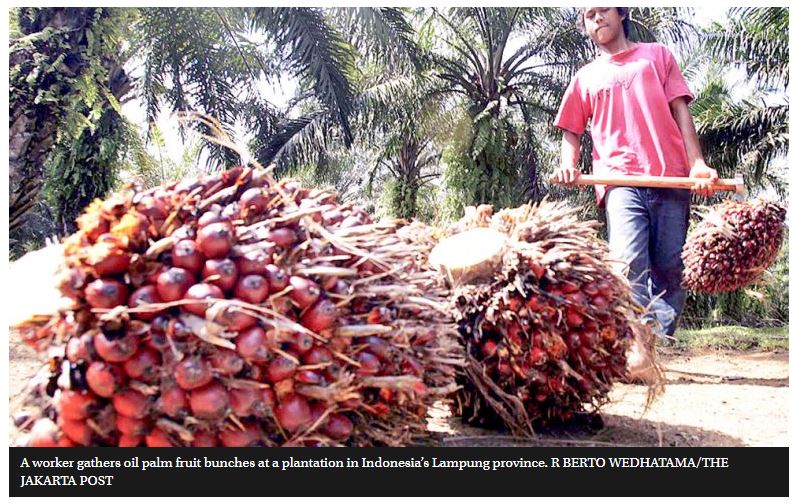Indonesia expects palm oil concession from Moscow
Indonesia is expecting Russian President Vladimir Putin to continue providing favourable treatment when it comes to palm oil exports by dropping a plan to impose a higher import tariff for the key commodity.
The Russian parliament approved a bill to impose a 20 per cent tariff – up from 10 per cent – on palm oil imports. The bill was sent to Russia’s Federation Council for final approval.
However, Putin, who is scheduled to visit Jakarta early next year, can still veto the bill.
Indonesian President Joko “Jokowi” Widodo sat with Putin last year on the sidelines of the Asean summit in Singapore and conveyed his wishes to double trade between the two countries to $5 billion.
The two leaders also talked about palm oil issues, and Putin promised to follow up on their discussion.
Palm oil is one of Indonesia’s biggest exports to Russia along with rubber, cocoa and electronic machinery. Meanwhile, Russia’s exports include wheat and phosphate. Tourist activities are also increasing between the two countries.
Indonesia is one of the biggest palm oil exporters in the world, together with Malaysia. The country exported about 32 million tonnes of the commodity last year, Indonesian Oil Palm Association data show.
However, the commodity used in various products ranging from soap and sunscreen to margarine and ice cream is now facing challenges, mainly from the EU.
Recently, the European Commission proposed imposing temporary duties of eight to 18 per cent on imports of biodiesel produced by Indonesian companies starting on September 6 on allegations that palm oil companies in Indonesia receive various incentives and special subsidies from the government.
‘Eyes on $5B bilateral trade’
Indonesian Ambassador to Russia Wahid Supriyadi said the government was lobbying Russia to drop the tariff hike bill before Putin’s scheduled visit to Indonesia next year.
“We are intensifying our lobbying [efforts] to prevent this tariff hike, because the two countries are committed to achieving bilateral trade valued at $5 billion next year,” Wahid said after opening the Indonesia Business Forum in Moscow on Thursday.
The forum was attended by representatives of 500 Russian and Indonesian companies. The forum also held a special session on palm oil, which was attended by producers and organisations. The infrastructure, energy and tourist sectors were also discussed by the government and the private sector.
The governors of Yogyakarta, Central Java and West Sumatra addressed the business meeting, along with Creative Economy Agency chief Triawan Munaf.
In addition to the forum, the embassy held a three-day Indonesian festival until Sunday, with participants coming not only from major companies, such as food product producers, but also small and medium businesses.
“Businesspeople from both sides need to know each other better,” Wahid said. “Ignorance from both sides is the problem.”
Russian Deputy Minister of Industry and Trade Alexey V Gruzdev said in his opening speech at the business forum that Indonesian companies were invited to invest with their counterparts in several sectors including ship-building, the aviation industry, railway construction and the oil and gas industry. Russia agreed to build railways in Kalimantan.
“Russia imports 80 per cent of its palm oil needs from Indonesia and we are also largest wheat exporter to your country,” said Gruzdev.
Meanwhile, Russian Union of Industrialists and Enterpreneurs president Alexander Nikolaevich Shokhin pointed out the importance of strengthening trade agreements between the two countries.
“Russia is a stable business partner for Indonesia,” Shokhin said. THE JAKARTA POST/ANN


 English
English




